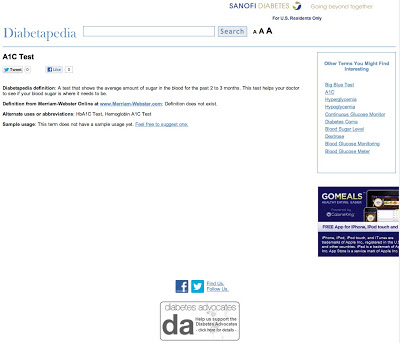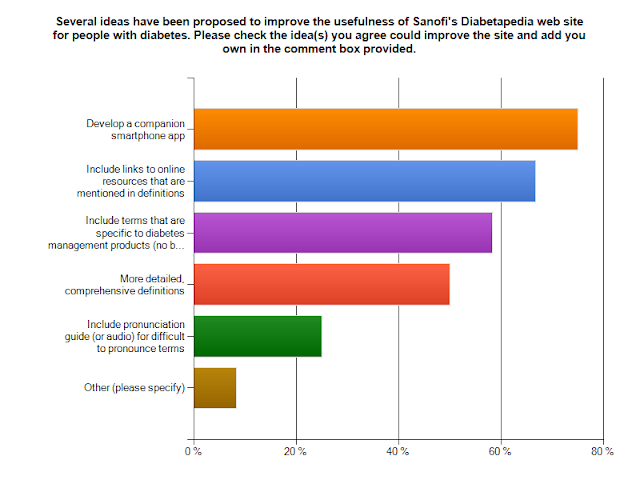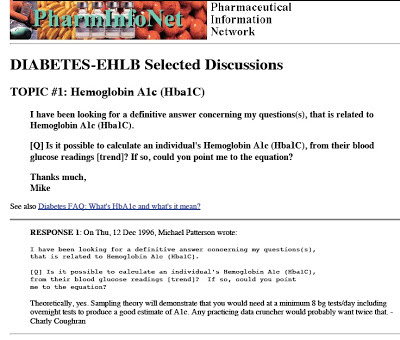In an “Open letter to NPR about Diabetes Social Media piece,” Kerri Morrone Sparling of Six Until Me, attempts to refute a claim made by Jason Bronner, a doctor at the University of California San Diego Medical Center, who said “There’s no proof in diabetes that social networking is helpful.”
Sparling, receives free products from two drug companies, and one pays her to speak at events and contribute at her site. In her disclosure statement Sparling says she is “employed by, run disclosed advertisements from, or consult with dLife, diaTribe, Incendia Health, Agamatrix, DexCom, BetterHealth LLC, Johnson & Johnson, LifeScan, Novo Nordisk, Children with Diabetes, Roche, The Juvenile Diabetes Research Foundation, Animas Corp, WEGO Health, and CVS.”
Such disclosures, however, are not enough for Jeff Chester of the Center for Digital Democracy, who says people don’t read disclosures and that “pharmaceutical companies are using social media to promote their gadgets and drugs in a deceptive way.” Chester, as you might recall, was a guest on my Pharma Marketing Talk Show (listen to the podcast: “New Media Tracking Technologies – Implications for Online Consumer Privacy“).
Disclosures aside, I want to get back to the question of whether or not today’s social media sites are “helpful” in diabetes (or any other chronic disease) and the stake that pharma companies have in promoting social media for diabetes.
Dr. Bronner obviously has a stake in proving whether or not SM helps patients. His study was featured in a segment of a local San Diego NBC affiliate news program, which concluded with a statement from Dr. Bronner’s group that said “social networks outside [my emphasis] the Internet do improve chronic disease management”:
Sparling says “initial evidence suggests that the benefits of social media to people living with chronic illness are real, even though large scale studies have not shown precisely who benefits and how much” and
“Dr. Bronner’s study leaves out one of the most important benefits that is consistently mentioned by people with diabetes online: connecting with others. When they connect, they no longer feel alone, and they receive much needed emotional support to help them go through the ups and downs of life with this chronic condition. And some of the end result measurements of health outcomes in diabetes, such as HbA1C, fail to capture all the preliminary steps necessary to achieve the behavior changes that result in improved, quantifiable outcomes.”
OK. What we have here is a failure to communicate. On the one hand, there’s the physician who’s looking for “evidence” that diabetes is being managed. That involves numbers such as Hba1C.
On the other hand is the patient argument that “emotional support” is also a key benefit.
One could argue that BOTH sides have merit, but if HbA1c levels in type 1 diabetics are are not brought to normal levels, then the disease is not being “managed” no matter how much “emotional” support the patient receives from social media.
Dr. Bronner’s study also aims to determine if social media can help diabetics “improve their knowledge skills and attitudes about their condition.” Sparling’s addresses the latter, but fails to say anything at all about the former; i.e., improving knowledge about diabetes.
I notice that there are a few dozen signers of Sparling’s “open letter.” Most of these are members of the “diabetes advocates” organization; i.e., people with diabetes. There is at least one pharma person who has also signed the letter and urged others to do so by (re)tweeting about it: Dennis Urbaniak (@Durbaniak).
Urbaniak, who is VP U.S. Diabetes at sanofi-aventis, was also quoted in the NPR piece about what his company has learned from type 1 diabetics on social media:
“In the past, the ads would always show the perfect blood sugar number, and the community says, ‘You know, that’s a bit insulting because it implies it is always easy to get this. Show a number that’s high or show a number that’s low. Make it real.’ And so this is the kind of feedback that’s been really helpful.”
Sanofi must also have learned that knowledge and education are also important social media deliverables for people with diabetes. That is why they launched “Diabetapedia,” the goal of which is “to help meet educational needs of diabetes community.” According to Laura Kolodjeski, Community Manager, Sanofi US diabetes, the overarching goal is to create “a single, comprehensive place where anyone can find and share definitions of diabetes-related terms and phrases” (listen to this podcast: “Diabetapedia: ‘Google’ for Diabetes“).
Dr. Bronner’s study is focused on one closed (by invitation only) social media community. If he was to look at Diabetapedia, I am sure he would find there is a lot more the site can do to “improve the knowledge skills” of people who use the site. Meanwhile, I have been running a little survey (here) to determine how sanofi can improve the usefulness of its Diabetapedia web site. Here is some preliminary results of that survey in a chart:
Social Media as it was Way Back When
Maybe some of these ideas will soon be implemented on Diabetapedia, but right now pharma-sponsored social media sites like this do not even equal the knowledge improvement skills that were available via Internet support groups as long ago as 1996. In support of that, I’ll give you one example based on my own experience with “DIABETES-EHLB,” an email-based discussion group for people with diabetes, diabetes educators, caregivers, and endocrinologists (for more background, read “Pharma ‘Social Networks’: Close But No Cigar Award“). It was sponsored by Hoechst Marion Roussel, a pharma company that later merged with other companies that eventually formed Sanofi-Aventis (funny how me and sanofi and its its predecessors have had relations going back to 1994; NOTE: I currently am NOT paid by sanofi or any of its agents and I do not run ads from pharma companies, unless they are Google adwords).
Contrary to Urbaniak’s experience, members of DIABETES-EHLB often discussed “numbers” like HbA1c for managing their disease. Here’s an example of a web archive page found on the “way back machine:”
Responses included detailed information about HbA1c tests copied from government sites like the National Institutes of Health, highlights of presentations at an annual ADA conference, and advice for where to have the test done by mail. If you are interested in seeing these responses, click here (pdf).
As opposed to this, here’s what Diabetapedia says about A1c:
I am impressed mostly by the emptiness of the page, which may reflect sanofi’s lack of interest in “numbers.” I assume that non-pharma diabetes social media sites offer better “knowledge skill” building than this.
 Diabetapedia may not be the best example of what sanofi is doing in concert with the diabetes online community (DOC). You might want to check out “Dennis Urbaniak, Joan Mikardos, and Laura Kolodjeski of Sanofi US Receive the 3rd PharmaGuy Social Media Pioneer Award.“
Diabetapedia may not be the best example of what sanofi is doing in concert with the diabetes online community (DOC). You might want to check out “Dennis Urbaniak, Joan Mikardos, and Laura Kolodjeski of Sanofi US Receive the 3rd PharmaGuy Social Media Pioneer Award.“
Sanofi is also pioneering in their use of “real patient stories” through its “Diabetes Co-stars Casting Call” contest, which is soliciting video submissions from patients. To learn more about this, listen to this podcast: “Sanofi US to Develop Documentary Featuring Real Patients and Their Stories.”











![6 Digital Tools at the Center of Healthcare Digitalization [INFOGRAPHIC]](http://ec2-54-175-84-28.compute-1.amazonaws.com/pharma-mkting.com/wp-content/uploads/2021/04/6DigitalTools_600px-100x70.jpg)




